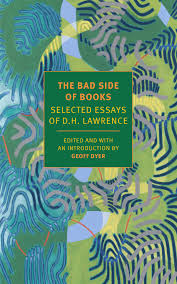Christine Smallwood at Bookforum:
 Lawrence was a mystic, consumed with a vision of each person’s soul as utterly foreign to all others, and yet capable of finding a form of human connection that is so vast that it can contain, as he writes in The Rainbow, “bonds and constraints and labours” and still be “complete liberty.” There is no writer more keenly interested in how men and women relate to one another, or in relatedness as such: the tension between the self—inviolate, contained, individual, isolate—and the couple. He imagined the task of art is the same as the task of life—to be in true relationship to one’s surroundings, in a dynamic flow. He believed the novel was a worthwhile form because in it every part is related to every other. He was a mystic seeking absolute truth, which now seems passé, and precious. His voice is as heady and vague as it is pure and urgent, and even his “worst pages,” as his contemporary Catherine Carswell wrote, “dance with life that could be mistaken for no other man’s.”
Lawrence was a mystic, consumed with a vision of each person’s soul as utterly foreign to all others, and yet capable of finding a form of human connection that is so vast that it can contain, as he writes in The Rainbow, “bonds and constraints and labours” and still be “complete liberty.” There is no writer more keenly interested in how men and women relate to one another, or in relatedness as such: the tension between the self—inviolate, contained, individual, isolate—and the couple. He imagined the task of art is the same as the task of life—to be in true relationship to one’s surroundings, in a dynamic flow. He believed the novel was a worthwhile form because in it every part is related to every other. He was a mystic seeking absolute truth, which now seems passé, and precious. His voice is as heady and vague as it is pure and urgent, and even his “worst pages,” as his contemporary Catherine Carswell wrote, “dance with life that could be mistaken for no other man’s.”
more here.
